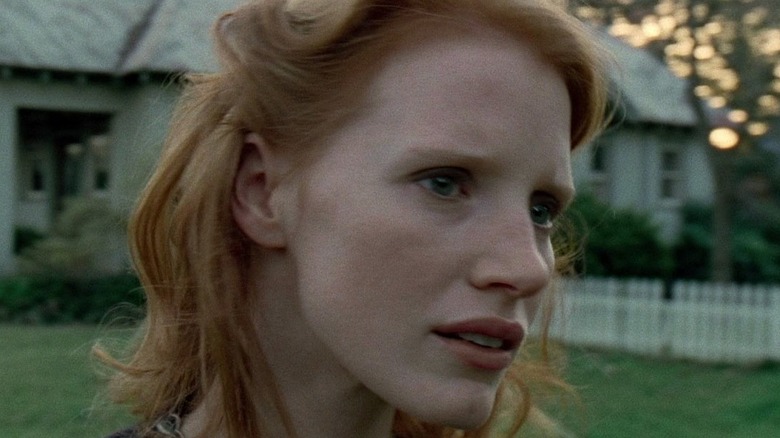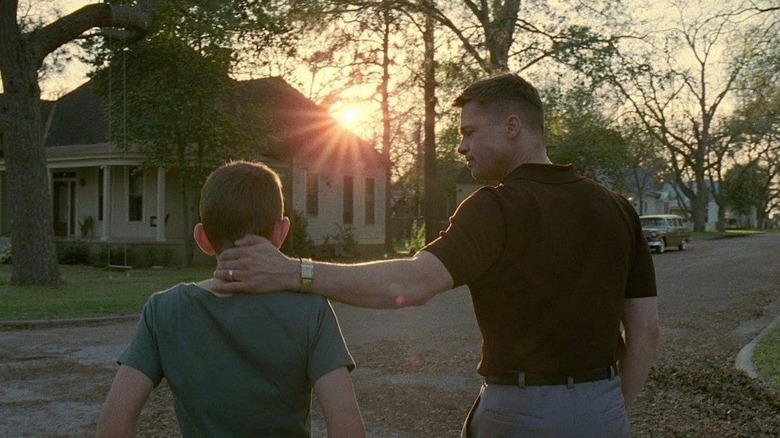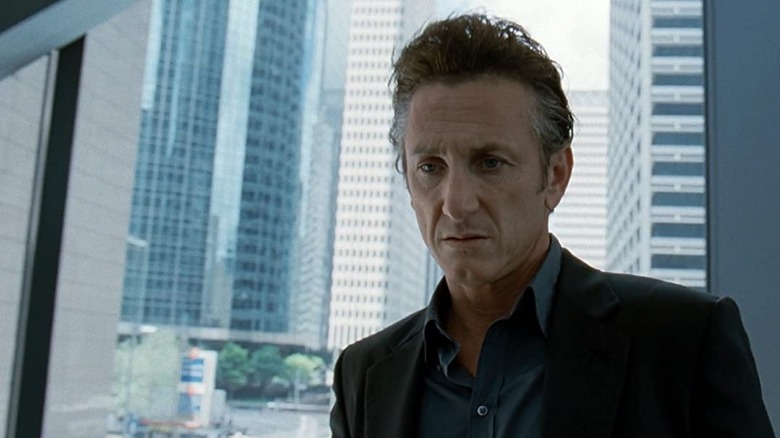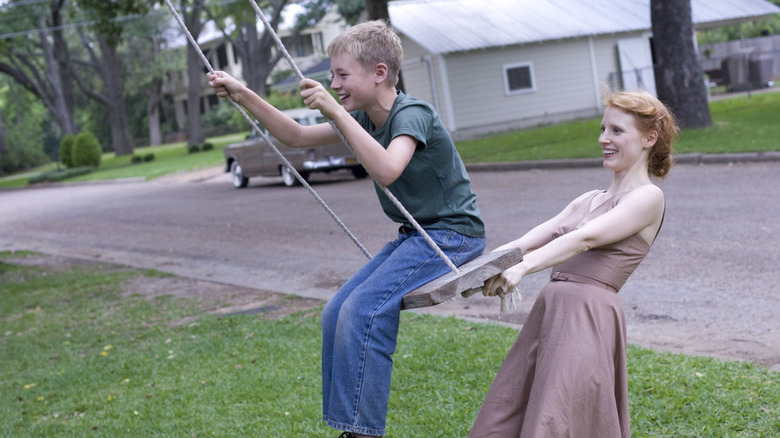The Ending Of The Tree Of Life Explained
What's "The Tree of Life" about? Perhaps the better question would be "What's 'The Tree of Life' not about?"
Roger Ebert said the acclaimed yet divisive 2011 Palme d'Or winner from director Terrence Malick was "attempting no less than to encompass all of existence and view it through the prism of a few infinitesimal lives" and compared it to "2001: A Space Odyssey." Then again, Michael Atkinson, writing in Sight & Sound, said "the religious intonations and parabolic auras don't suggest the complex view of a retrospective adult, only the dreamy feelings of the kid, stuck in a rather ordinary family conflict." No wonder it's considered one of the most baffling movies of the new century, one that caused at least one theater to post a sign on the door explaining that there would be no refunds.
Whatever your takeaway on its themes and its presentation of them, it's fair to say the film's not trying to convey them through traditional dramatic means like rising action, falling action, climax. There's no twist. It doesn't all click into place at the end. Instead, it is the interconnection of its images of life and death, the birth of the cosmos, dinosaurs roaming the Earth, and most of all, a boy's childhood growing up in a small Texas town, that conveys the film's meaning. The beach everyone is standing on in the film's closing moments doesn't have a collapsed Statue of Liberty waiting at the end of it. Jessica Chastain's Mrs. O'Brien does not turn out to have been one of those dinosaurs all along.
What does the setting of the final sequence in The Tree of Life mean?
So it's probably best not to think of the closing sequence as strictly the conclusion of a storyline, either that of Jack O'Brien (played as an adult by Sean Penn) or his family. In fact, the film will likely defeat you if you do, since when Jack meets up with his parents on a wind-swept beach they look as they did in his childhood, with his brothers also as children even though he remains roughly Sean Penn-aged. The location exists out of time in more than one way; there's a shot of Chastain holding the wrinkled hand of some unseen elderly person up to her lips, but when she lowers the hand it seems to be young again. The beach is crowded with people outside of the O'Brien family, and all of them seem to be wearing the sort of period clothing Mr. and Mrs. O'Brien wore during Jack's childhood and have on in this scene. Jack is the one who looks out of place, still in his modern suit.
Why a beach? Other than the fact that the wind and the light make it a heck of a setting for Malick and cinematographer Emmanuel Lubezki to produce the film's stunning visuals, the shoreline could be seen as representing some liminal place, the meeting of the earth, the water, and the heavens, all of which have had their place in Malick's imagery throughout the course of the film.
What significance does the ending of The Tree of Life have for Jack O'Brien
In the film, Jack appears to have been journeying to this place for a long time, which along with the other clues, suggests that it's some kind of afterlife, or perhaps the border between life and death. Is he happy to have reached this point? It's tough to tell in the moment. Many, but not all, of the times the audience sees him during the sequence he's being shot from over the shoulder, him looking on at his family. He seems to reach some level of closure with them by bringing them his brother, R.L. (Laramie Eppler), whose death as a young man looms over the film. There are shots where Jack's hand is placed on his domineering father's (Brad Pitt) shoulder, then seconds later, his father's hand placed on Jack's, suggesting an acknowledgment that here they might recognize each other as peers.
But the film doesn't end on the beach. After his visions, which include more with his mother and R.L., finally conclude, Jack is back in an elevator in a tall building in the cityscape we've seen him inhabiting. Here, as he exits the building, he does seem happy. Jack, it seems, wasn't actually dying, but rather having a vision or a premonition of what the experience will be, a place where the pains of his life, and those of others, might be soothed.
How does the ending relate to the rest of the film?
The film itself is more than just Jack's vision of the afterlife. It's him contextualizing his entire life, particularly his own origins. "The Tree of Life" could be read as Jack coming to terms with the forces that shaped him, not just his benevolent mother and his cruel father, who Pitt says can be seen as representing grace and nature, respectively, but also the whole history of the cosmos and of the Earth.
That's one way so many of its spectacular but disorienting visual tangents fit into the film, from the formation of the Milky Way to the dinosaurs to the giant and very real live oak tree that Malick and Lubezki spend so much time shooting the sunlight coming through, which was there long before Jack was born and will likely remain long after he's gone to whatever afterlife he passes through. The film opens with a quote from the Book of Job, "Where were you when I laid the foundations of the Earth?" and one way to look at the rest of it is as Jack attempting to answer that question for himself.
And if that doesn't sound quite right, then hey, you wouldn't be the only one who thinks so. If it was quite so cut and dried, it wouldn't be Terrence Malick.



